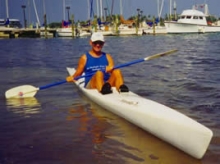Patients speak about prostate cancer and laparoscopic radical prostatectomy

Charles Yatman, Miami, Florida
For a long time, my prostate specific antigen, PSA, was going up. Two previous biopsies showed no cancer. Then, a few months ago, when my PSA went up to 15.9, my biopsy showed a cancer of the prostate. I was not happy. At 70 year old, I had been busy volunteering as a kayaking judge for the International Olympic Committee and having fun.
My initial research led me to men who'd had traditional radical prostatectomy. One man described a prolonged, tedious, painful recovery. This did not appeal to me. So I chose the laparosocopic radical prostatectomy, hoping to avoid pain and dysfunction. I had many concerns, from getting the cancer out, saving the nerves for erection, and getting back on my feet to resume my life.
I had surgery in August of 2001 and went home the next morning. By comparison to a hernia operation that I had, the laparoscopic radical prostatectomy was certainly much less debilitating. The picture you're seeing is of me kayaking in Biscayne Bay about two weeks later. My colleagues from the world of canoeing and I were frankly astounded at my quick recovery and my immediate return to full life. At a Rotary Club luncheon two weeks after surgery, nobody suspected I had just been hospitalized from successful removal of a malignant tumor.
In my followup, I learned that my cancer had been extensive, having grown outside my prostate. Dr. Krongrad had recommended we not spare my nerves on the side of the tumor, because of the risk of compromising the cancer operation. It's a good thing we did not spare the nerves. We learned from the pathologist that the cancer had indeed grown outside the prostate on that side and into the fat. Despite this, because of Dr. Krongrad's technique, my surgical margins were not involved and, today, my PSA is zero and there is no evidence of residual cancer.
I did have to rethink my dietary habits. I had regularly had large daily doses of coffee, Coke, and pots of tea. It seems that this pattern was not helping my urinary control after surgery and some adjustments were in order. With dietary adjustments and some patience, my continence is returning. With a little Viagra, even my erections are coming back, even though I am 70 and half my erection nerves were severed. I'm doing great.


